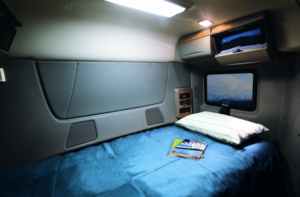
 The average adult needs between seven and nine hours of sleep. But with irregular sleeping schedules and potentially noisy environments, getting enough sleep can be a real challenge for truck drivers. And in addition to these challenges, the University of Pennsylvania, FMCSA, and ATA found that 28% of truck drivers have sleep apnea – almost one third of drivers!
The average adult needs between seven and nine hours of sleep. But with irregular sleeping schedules and potentially noisy environments, getting enough sleep can be a real challenge for truck drivers. And in addition to these challenges, the University of Pennsylvania, FMCSA, and ATA found that 28% of truck drivers have sleep apnea – almost one third of drivers!
Not only can sleep deprivation cause memory impairment, mood swings, headaches, and much more, but when combined with driving a heavy-duty truck, it’s an even more serious problem.
Drowsy driving is extremely dangerous, for you and those around you. Here are a few tips to overcome drowsiness:
- Try to get at least 7 hours of sleep every night.
- Check your prescriptions, as some may cause drowsiness. If they do, talk to your doctor about the best solution.
- Drink some caffeine when you feel you could use a short term boost of energy. But keep in mind that it may cause a crash later, and that caffeine is also not a substitute for sleep.
- Take power naps when needed. If you’re feeling drowsy, find a safe place to pull over and take a short 20 minute power nap.
How to get better sleep in your truck:
- Find a good place to park for the night. Try to find a safe and quiet place at a truck stop, travel center, or rest area. A safe and quiet area can make all the difference in improving sleep.
- Think about upgrading your mattress. If you’re uncomfortable on your sleeper’s mattress , it can be well worth it to upgrade it or to purchase a mattress topper to go over it.
- Install shades to better block out the light. If light breaking in to the sleeper cab is disrupting your sleep, it can be worth it to take further measures to blocking out the light. Adding shades and curtains can create a significantly better sleeping environment, no matter the time of the day.
- Avoid your phone or other electronics before you go
 to sleep. Blue light suppresses hormone melatonin and stimulates your brain – the opposite of what you want right before bed! Try to avoid electronics right before bed and instead try reading a book or magazine.
to sleep. Blue light suppresses hormone melatonin and stimulates your brain – the opposite of what you want right before bed! Try to avoid electronics right before bed and instead try reading a book or magazine. - And once you do go to bed, silence your phone or put it on “Do Not Disturb” mode. The last thing you want is to finally fall asleep just for your progress to be disrupted and reversed with a waking notification. So avoid your phone before sleep, and make sure it doesn’t alert you during your sleep.
- Though it may not always be possible, try to stick to a consistent sleep schedule. If you go to bed and wake at the same time everyday, and follow all the previous tips, the quality of your sleep will certainly improve!
To help with sleep on the road, LTI will be distributing complimentary eye masks to all our drivers in the coming weeks!
For more information about improving your sleep and fighting sleep deprivation, check out our latest Mile Marker (22.2) which goes even more in depth on the subject.